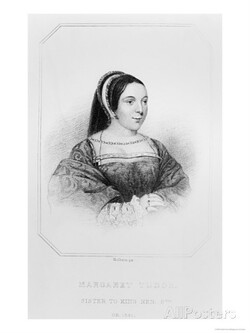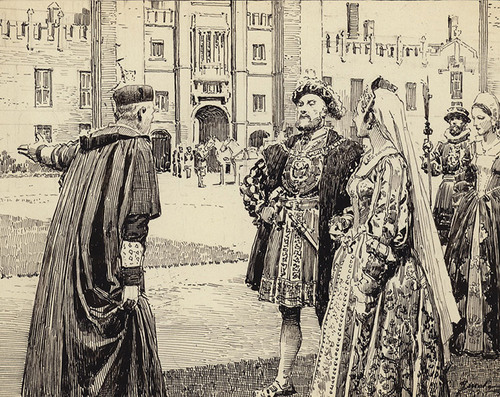-
Today in Tudor History...
30 September 1399 – Henry IV is proclaimed King of England.
1440 – Death of Reginald Grey, 3rd Baron Grey de Ruthyn, Welsh soldier and politician
1487 – Death of John Sutton, 1st Baron Dudley, English politician, Lord Lieutenant of Ireland
1515 – Margaret Tudor, sister of Henry VIII and Queen Consort of James IV, fled to England.

1529-Henry VIII to Clement VII

On the return to your Holiness of cardinal Campeggio, we could have wished, not less for your sake than our own, that all things had been so expedited as to have corresponded to our expectations, not rashly conceived, but owing to your promises. As it is, we are compelled to regard with grief and wonder the incredible confusion which has arisen. If the Pope can relax Divine laws at his pleasure, surely he has as much power over human laws. Complains that he has often been deceived by the Pope's promises, on which there is no dependence to be placed; and that his dignity has not been consulted in the treatment he has received. If the Pope, as his ambassadors write, will perform what he has promised, and keep the cause now advoked to Rome in his own hands, until it can be decided by impartial judges, and in an indifferent place, in a manner satisfactory to the King's scruples, he will forget what is past, and repay kindness by kindness, as Campeggio will explain. Windsor, 30 Sept. 1529.
1534-Chapuys to Charles V.
The lord Hussey (Usey), chamberlain of the Princess, who for his good sense and prudence was one of the principal councillors of Henry VII.; desiring of late to go home to the North, sought a secret interview with me before his departure, when he told me plainly what he had before expressed more covertly, that he and all the honest men of the kingdom were very much dismayed that your majesty did nothing to remedy affairs here, as it could be done so easily,—that the thing concerned the lives and interests of the Queen and Princess and the honor of your majesty, and that it was God's cause, which you, as a Catholic prince and chief of other princes, were bound to uphold, especially out of pity for all this people, who regard you with as much affection as if they were your own subjects. I told him you were desirous of the peace and union of Christendom, and to preserve the ancient friendship with this king, for which there was no better means than to maintain the rights of the Queen and Princess, and wait the other terms of justice in discharge of the oath you had made to this king; and I thought that even if your majesty had every opportunity to remedy affairs by war, nevertheless you might object to do so for fear of oppressing this innocent people ; and as he was a wise and experienced man, I begged him to declare what he would do if he were in your majesty's place. He said, as to the disposition of this kingdom, I might know it in part as well as he ; nevertheless he would assure me that almost everybody was expecting your majesty would begin to move to their assistance, and you need have no fear of oppressing them by making war, because the indignation of the people was so great that everything would be reformed immediately before any resistance could be offered. As to the form of the war, as you had experienced soldiers, he would not enlarge upon it, especially as he knew that lord Darcy, whom he called his brother, would explain the matter for me much better than he could, being a person of long experience in the business. One thing he would not forget to say, that your majesty ought first of all to make the said war, which might at once remedy everything, by the insurrection of the people, who would be joined immediately by the nobility and the clergy also, which is powerful and half in disorder.
Yesterday, just after this interview, I sent to lord Darcy by one of my confidential servants, who, after conversing about other things, began to speak of the above matters, conjuring him to keep it secret, as it might cost him his life. He said he considered himself as one of the most loyal vassals the King had in matters which did not injure his conscience and honor, but that the things treated here were so outrageous against God and reason that he could not hold himself for an honest man or good Christian if he consented to them, especially in matters which concern the faith, and that in the North he knew well there were 1,600 (“sez C”) earls and other great gentlemen who are of his opinion, although he had only declared himself to one or two, and had not even given any indication of his mind to his two sons, who are as valiant in arms as any in the kingdom. The younger has just been made captain of Jersey (lisle de Jerce). The said lord intends, by leave of the King, shortly to go to his own country ; and as it was proposed that measures should be taken in this parliament to introduce the Lutheran sect, he and his adherents would do their best to animate the people against it. With the assistance of your majesty he would raise the banner of the Crucifix together with yours, and among the first things he would do would be to seize some lords who favoured these follies, such as the earl of Northumberland and some others. The assistance he desired from your majesty would be, first, that you should have intelligence with the king of Scots that he might make an invasion while they were bestirring themselves, and that you should send some small force to the mouth of the Thames to give fight to those hereabout. It would be necessary also to bring a small number of harquebus men to the North, with harness and other munitions of war, and some money for poor gentlemen who lack means to equip themselves, lest they should be gained by the King ; for in the North there were great lords, but they had no money to advance to others ; and as to the said lords, they would not care to take money, but would readily spend their own. For himself, he would put in the field 8,000 men of his own and his friends', and he begged for the honor of God that I would not sleep in the matter, in which I would do the best service both to God and your majesty. In the end he told my man that before he left here he would consider more particularly the whole subject, and communicate his intention to me or to my said man. I shall not fail to spy out an opportunity. I hold it certain that there are innumerable lords who would say as much as he if they dared. Of those who take part with him he named two, who are among the most powerful of the kingdom. The one is the earl of Derby (conte dAlby), the other lord Dacres, who has little reason to be satisfied with this king, nor with those who manage affairs ; for although he has been declared innocent of the charge brought against him, the King, besides taking away all his offices, retains his goods both in ready money and moveables, worth more than 50,000 ducats.
No news from Ireland is known since my last, though some has been received at the Court. I am told that part of the men that Skeffington took with him deserted, which he made his excuse for delaying to cross. The King, however, is displeased with his delay, and has sent him express orders to leave by the first wind, whatever comes. One of the King's two ships of which I wrote has already gone down the river, the other will not delay long. It is sent to discover who goes and comes in Ireland.
The day before yesterday a German arrived here with five servants, who I hear came from Antwerp, and did not wish to be known there. Some say that he belongs to the duke of Saxony, others to the duke of Lunenburg, seeing that he speaks Low German. He went yesterday through the town accompanied by some servants of the doctors of Lubeck and Hamburg. I will endeavor to discover who he is. 30 Sept. 1534.
1538-The Two Marriages.

Memorandum respecting Henry VIII.'s proposed marriage with the Duchess of Milan and that of the princess Mary with the Infant Dom Loys.
The Emperor's wish is, first, that his ambassadors in England grant nothing against the Church or the authority of the Apostolic See, nor against the Princess' rights to the succession; that the Infant and Princess be not compelled to sign anything against the Church or Apostolic See; to know what dowry he proposes to give the Princess; that the king of Portugal is ready to maintain his brother in a princely state, and the king of England ought rather to look to the personal merits and age of the personage than to his material wealth; that the Emperor guarantees all promises made by the King and Infant of Portugal, and will be glad to enter into an offensive and defensive league with both states, and so will the king of the Romans. Should the king of England suggest ratifying the last treaty, the ambassadors shall decline on the plea that there are articles therein which do not concern Portugal or the king of the Romans. Should the king of England hint at a new league, they shall listen to his proposals without accepting or rejecting any terms, however hard they may appear. To grant nothing touching old confederacies with Scotland. To secure the succession to the Princess in case of the King dying without male or legitimate issue. To procure that the King shall assign to the Princess the largest dower possible on some estate which she herself may enjoy, besides a considerable sum of ready money; and to have the dower properly valued, so that in the event of the King's death she may know what to claim.
The ambassadors shall remember:—(1) that the king of England will gladly declare against the Turk provided the Emperor will declare against the Pope; (2) that the King refuses to declare the legitimacy of the Princess, but will declare her heiress to his throne, should he die without legitimate children, and that in any case she shall be preferred to the daughter of Anne Boleyn, the beheaded Queen; (3) that he offered to give her 100,000 crs. down and 20,000 crs. a year as dower, which his ministers have since reduced to the 100,000 crs. only. The Imperial ambassadors said that for every 100,000 crs. Henry gave, the Infant would give 5,000 as a marriage portion; but nothing was fixed, and the King's consignment was originally made upon the lands of suppressed monasteries and not in ready money. On the other hand, the King stipulated that the Emperor should defend him against the Pope, that the Council should not be held at Cambray, and that wherever" held, nothing should be treated therein to his detriment. The ambassadors tacitly owned that the Emperor intended to give Milan to the Infant; and this so pleased the King that he at once offered money to defend him against his enemies, and also to declare against the Turk. The King, nevertheless, requested that the investiture of Milan should be delayed till after the conclusion of the marriages. Since then the Emperor had offered Milan to the King on condition of his making a league offensive and defensive; but the English excused themselves on the plea of expense, the Emperor having so many enemies.
ii. The King's marriage with the duchess of Milan.
Cromwell first suggested it to the Imperial ambassador (Chapuys), and proposed that of the prince of England with the Emperor's daughter (Mary) and of the King's daughter by Anne Boleyn with the son of the duke of Savoy or of the king of the Romans. The proposal being renewed, the Imperial ambassadors declined to treat of such marriages on account of the youth of the parties, &c.; but said that, if the King would treat of his own marriage with the duchess of Milan, the Emperor would give her 100,000 crs. as dowry and 15,000 crs. a year, together with her rights to her mother's inheritance, and would endeavour to get the countess Palatine to cede to her her right to the crowns of Denmark and Norway, and even, if necessary, aid him in the conquest of these kingdoms. The King, thereupon, asked for an increase of the dower and marriage portion, and that it should be assigned upon Flanders, as Milan was not secure, and said he did not care for the rights the Duchess might have to Denmark. The ambassadors replied that the dowry was sufficient, and that the King ought not to insist upon such trifles. They also offered that the Emperor should mediate between the Pope and the King; but this the King would not hear of. The King then asked the investiture of Milan for his daughter, and the ambassadors replied that Milan could not be disposed of without the consent of the Italian powers; and, moreover, there was nothing to fear in that quarter, since in the agreement with king Francis there was nothing to his detriment.
In a despatch, addressed to the queen Regent of Flanders, Don Diego says that in treating the marriage between the Princess and the Infant great care should be taken that she be declared legitimate, and if the King will not agree to that, no mention of his refusal must be made in the marriage contract, so as not to hurt her right to the succession. To insist, however, upon the largest possible dower, she being daughter of queen Katharine, who had 200,000 ducats. That it would be well to draw out a secret protest that in treating the marriage her rights to the succession are not to be impaired. The Emperor writes approving his ambassador's answers to the King's two proposals, viz., that the Emperor should not consent to the General Council, and that he himself is unwilling to declare the legitimacy of his daughter. The answers were that the Emperor could not make such a promise, as it was against God and reason, and that if the King would not acknowledge his daughter's legitimacy, he was at least bound to reserve her right to the succession in default of other children.
In a letter of 28 July 1538 the Emperor writes that the English ambassador had asked him to urge on the said two marriages, and that, even if the other were delayed, the King's with the duchess of Milan should be proceeded with; making no objection to the Emperor's voluntary disposal of Milan, and offering to contribute to its defence provided full powers were sent to the queen Regent to treat of his own marriage with the duchess of Milan. The Queen is to endeavour to discover what the King means by this new proposal, but, in order not to displease the king of France, she is to conclude nothing without first letting the Emperor know; much less arrange an interview with the King at Calais or elsewhere, which the English ambassador seems anxious for, or make any definitive agreement with respect to Milan, for the French have not yet lost all hope of getting possession of it somehow. Should the King or his ministers mention it, the Imperial commissioners must reply that, as the King's answer to the Imperial ambassadors on that point had been both cold and unmeaning, it was necessary that he should make a new declaration of his intentions therein within a fixed period; not forgetting to state that the Milan question is open to many considerations. The English ambassador with the Emperor has complained that his master was not expressly comprised in the treaty of Nice, saying, "Perhaps, by not mentioning my master in the treaty of Nice, the object was to show that he is not a Christian king, since he has denied obedience to the Church of Rome?" The ambassador again requested that the Emperor would engage that nothing to the King's detriment should be discussed in the General Council. The answer was that such a request was unreasonable. The ambassador also requested that particular instructions should be sent to the Queen Regent touching the dowry and rights of the Duchess, besides the cession of Denmark. This was promised. He also spoke of the defence of Milan, and was told that the assistance proffered is now subject to other considerations, as circumstances have greatly altered; also that if the marriages were to go forward he must proceed more seriously than hitherto.
The Emperor's resident ambassador in England (Chapuys) writes, on the 31 August 1538, that the King objected to the powers sent to the Queen, on the ground that they were insufficient to treat of the marriage between the Infant and the Princess, which was the principal point of the two, that the Emperor did not know what property the Infant had to offer as security for the Princess' dower, and had not received, from the Infant, sufficient powers to proceed. Moreover, Henry wished the negociations carried on in England through the medium of the queen of Hungary. The Emperor's answer was that the English ambassador at his Court had seen the powers, and that Dom Loys himself would not contradict any statement made by the Emperor. Chapuys also says that the King, by declaring the Princess' marriage to be the more important of the two, shows clearly that his aim is to create jealousy between the Emperor and Francis about Milan. Cromwell must have said somewhere that a marriage was in contemplation between the duchess of Milan and the young duke of Cleves, and that it was a reflection on his master to be refused for a Duke; also that, once in possession of Milan, his master's affairs would go on well, and everything else be settled. The King, moreover, said to the French ambassador that he would have Milan in spite of any prince, and that it had been actually offered to him even after the interview at Aigues Mortes.
1541 – Spanish conquistador Hernando de Soto and his forces enter Tula territory in present-day western Arkansas, encountering fierce resistance.
1544 - King Henry VIII draws his armies out of France after his victory in Boulogne.

1553 – Mary I’s coronation procession from the Tower of London to Whitehall.

1555 - Bishop of Oxford Nicholas Ridley sentenced to death as a heretic

1585 – Philip Howard, Earl of Arundel and son of Thomas Howard, 4th Duke of Norfolk, was received into the Catholic Church by Jesuit William Weston at Arundel Castle.

source:wikipedia,http://www.onthisdayintudorhistory.com/,http://www.historyorb.com/,http://www.british-history.ac.uk/
